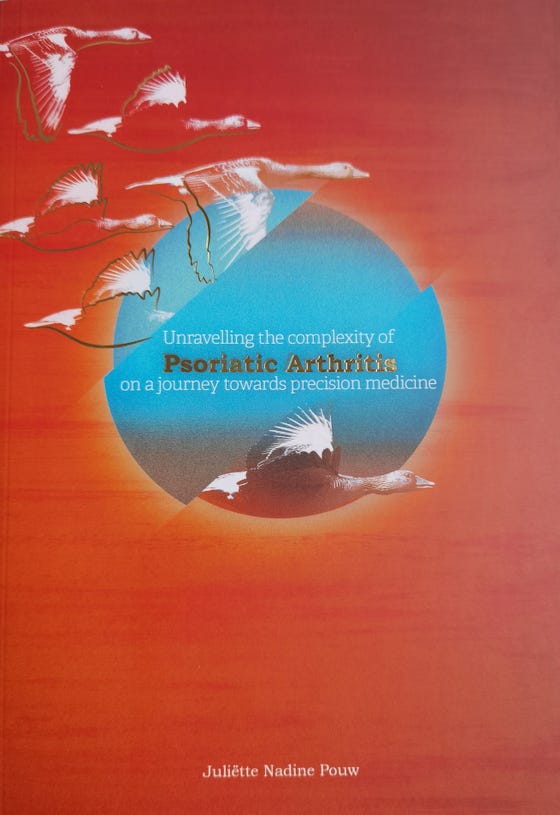Sep 1: Unravelling the complexity of psoriatic arthritis on a journey towards precision medicine
Sep 1: Unravelling the complexity of psoriatic arthritis on a journey towards precision medicine

Psoriatic Arthritis (PsA) is a complex, musculoskeletal disease, characterized by a heterogeneous clinical phenotype and variable disease course. With new treatment options emerging, it has become difficult for rheumatologists to know which therapy is best for which patient. Postponing efficacious therapy - even for six months - can result in irreversible progression of joint erosions, decreased long-term physical function and reduced risk of medication-free remission. Hence, there is an urgent clinical need to tailor medical treatment to individual patients.
Precision medicine
The PhD research by Juliëtte Pouw (Department of Rheumatology & Clinical Immunology and Center for Translational Immunology, UMC Utrecht) discusses recent advances to unravel the complexity of PsA, on a journey towards precision medicine. The clinical work presented in this thesis provides indirect evidence for the efficacy of conventional synthetic disease modifying anti-rheumatic drugs (csDMARDs) in PsA. The results of a literature review and experimental laboratory research underline the importance of the adaptive immune system in disease pathogenesis. Two new dysregulated T cell mechanisms are discovered, which could be investigated as therapeutic targets.
Need for robust predictors
Furthermore, by clinical research and reviewing literature the need for robust disease predictors is confirmed, both for the development of PsA in psoriasis patients and for the response to therapy. In addition, the high extent of psoriasis skin activity in PsA patients reinforces the necessity of multidisciplinary collaboration between rheumatologists and dermatologists for optimal PsA care. In recent years, advancing experimental methods, analytical techniques and computational modeling approaches have enabled researchers to study an increasing range of clinical, (epi)genetic, immune, and other biomarkers. Future research is warranted to discover and validate robust prediction models to facilitate personalized treatment and prevention of PsA.
Progressive condition
PsA is a type of arthritis that affects approximately 30 percent of people with the skin condition psoriasis. It typically causes affected joints to become swollen, stiff and painful. Like psoriasis, PsA is a long-term condition that can get progressively worse. If it's severe, there's a risk of the joints becoming permanently damaged or deformed, and surgery may be needed. But if PsA is diagnosed and treated early, its progression can be slowed down and permanent joint damage can be prevented or minimized. It tends to develop 5 to 10 years after psoriasis is diagnosed, although some people may have problems with their joints before they notice any skin-related symptoms.
PhD defense
Juliëtte Pouw (1991, Leiden) defended her PhD thesis on September 1, 2022 at Utrecht University. The title of her thesis is “Unraveling the complexity of psoriatic arthritis on a journey towards precision medicine”. Supervisors were dr. Marianne Boes (Center for Translational Immunology, UMC Utrecht) and prof. dr. Jaap van Laar (Department of Rheumatology & Clinical Immunology, UMC Utrecht). Co-supervisors were dr. Emmerik Leijten (Sint Maartenskliniek, Nijmegen) and Julia Spierings (Department of Rheumatology & Clinical Immunology, UMC Utrecht). Juliëtte will soon start her residency training to become a rheumatologist at the Sint Antonius Hospital in Nieuwegein.


